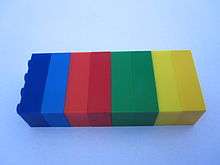Lego clone

A Lego clone is a line or brand of children's construction blocks which is mechanically compatible with Lego brand blocks, but is produced by another manufacturer. The blocks were originally patented by The Lego Group in 1961 as "toy building bricks",[1] and the company has since remained dominant in this market. Some competitors have moved to take advantage of Lego brand recognition by advertising their own products as compatible with Lego, with statements such as "compatible with leading building bricks".
The underlying patents of invention are long expired, opening the field to rivals.
Legal challenges
At least two of the largest clone manufacturers have been challenged in court by Lego. The lawsuits have been mostly unsuccessful, for courts have generally found the functional design of the basic brick to be a matter of patent rather than trademark law, and all relevant Lego patents have expired.
The Canadian company Mega Bloks was sued on the grounds that its use of the "studs and tubes" interlocking brick system was a violation of trademarks held by Lego. On November 17, 2005, the Supreme Court of Canada upheld Mega Bloks' right to continue selling the product in Canada.[2] A similar decision was reached by the European Union's Court of First Instance on November 12, 2008, upholding an EU regulatory agency's reversal of opinion following an objection by Mega Bloks against a trademark awarded to Lego in 1999.[3] On September 14, 2010, the European Court of Justice ruled that the 8-peg design of the original Lego brick "merely performs a technical function [and] cannot be registered as a trademark."[4]
The English company Best-Lock Construction Toys sued Lego in German courts in 2004[5] and 2009.[6] The German Federal Court denied Lego trademark protection for the shape of its bricks in the latter case.[7]
The Lego Group did score a success in 2002, when its Swiss subsidiary Interlego AG sued the Tianjin CoCo Toy Co., Ltd. company for copyright infringement. A claims court found many CoCo sets to be infringing; CoCo was ordered to cease manufacture of the infringing sets, publish a formal apology in the Beijing Daily, and pay a small fee in damages to Interlego. On appeal, the Beijing High People's Court upheld the trial court's ruling.[8]
Major Lego-compatible brands
References
- ↑ US patent 3005282, Christiansen, Godtfred Kirk, "Toy Building Brick", issued 1961-10-24, assigned to Interlego A.G.
- ↑ "2005 SCC 65". CanLII. Retrieved 2015-03-09.
- ↑ "Lego loses trademark ruling in EU". The New York Times. October 12, 2008.
- ↑ "Montreal's Mega Brands triumphant after Lego loses trademark challenge". Archived from the original on September 19, 2010. Retrieved December 31, 2011.
- ↑
- ↑ von RA Dennis Breuer (2012-04-19). "Pressemitteilung des BGH Nr. 158/2009: Legostein als Marke gelöscht | markenmagazin:recht". Markenmagazin.de. Retrieved 2012-10-09.
- ↑ "Pressemitteilung Nr. 147/04 vom 3.12.2004". Juris.bundesgerichtshof.de. Retrieved 2015-03-09.
- ↑ "News". Ccpit-patent.com.cn. Retrieved 2012-10-09.